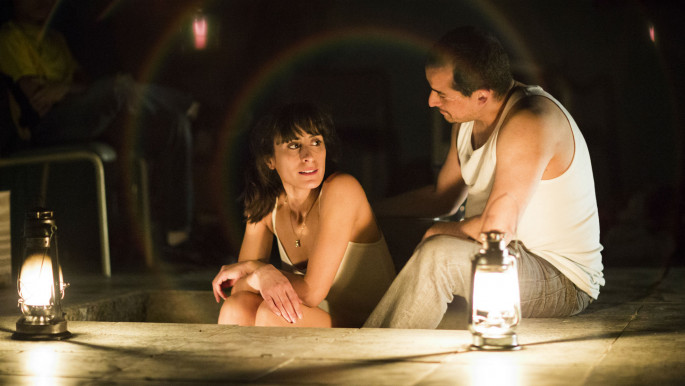
Fireworks, deafening and silent, all at once
Fireworks, deafening and silent, all at once
Review: A new play opening in London examines life in a Palestinian-esque situation, with two families living in extraordinary circumstances.
3 min read
Saleh Bakri and Shakira Riddell-Morales appear in 'Fireworks' at London's Royal Court Theatre [Helen Maybanks]
All seats in London's Royal Court Theatre were filled for the 20 February premier of Fireworks, a new play by Palestinian playwright Dalia Taha, directed by Richard Twyman.
The play tells the story of two neighbouring families forced to pass time in their apartment block under unspecified war-like conditions outside.
Loosely drawing upon the experience of the occupied Palestinian territories without being explicit where or when, the play delves into themes examining the human impact of everyday life under prolonged extraordinary conditions: how couples attempt to provide a sense of normalcy and security for themselves and their children under conditions defined by its opposite; how people cope - or don't - when faced with unconscionable loss; and how an overwhelmingly disempowering reality tests every facet of sanity, agency, and dignity.
The playful interactions between each family's children allow these themes to unfold naturally, as their fantasy world is repeatedly punctured by the explosions of the external environment, and the internal ruptures associated with loss of innocence, stability and trust in one's parents.
Fireworks is a hauntingly effective play.
It left me with a lump in my throat for much of the performance in so far as it was able to capture that disturbing sense of powerlessness and confinement of life under siege, curfew and military bombardment.
Here, time and space are not neutral, but ominous and suffocating, framing the conditions in which people strive to resolve the irresolvable tensions of their conditions.
The eerie background buzz of drones, and the unchanging drab setting of a poor apartment block, force the audience to experience an all too common condition of Palestinians and Arabs today - how to cope with poverty, powerlessness and an inability to flee forms of violence, both direct and structural.
Here lies the effectiveness of Fireworks - found not in bursts of dramatic violence or overt political polemics, but on the far more subtle levels of a mother's descent into madness, a father's fatuous efforts to preserve his sense of manliness, and the children's desire to experience and invert conditions of power over one another through their play.
By providing a window into how asymmetrical power relations are experienced by the weak, the very real and disquieting consequences of injustice upon the finite and delicate human condition are revealed.
This is especially important for Western audiences to gain insight into in an era where the complicated political realities of the Middle East are all too often inadequately explained or distorted by media and politicians, and the dehumanisation and exceptionalism of Arab and Muslim societies has become the broad norm.
Fireworks is playing at the Royal Court Theatre until March 14.
The play tells the story of two neighbouring families forced to pass time in their apartment block under unspecified war-like conditions outside.
Loosely drawing upon the experience of the occupied Palestinian territories without being explicit where or when, the play delves into themes examining the human impact of everyday life under prolonged extraordinary conditions: how couples attempt to provide a sense of normalcy and security for themselves and their children under conditions defined by its opposite; how people cope - or don't - when faced with unconscionable loss; and how an overwhelmingly disempowering reality tests every facet of sanity, agency, and dignity.
The playful interactions between each family's children allow these themes to unfold naturally, as their fantasy world is repeatedly punctured by the explosions of the external environment, and the internal ruptures associated with loss of innocence, stability and trust in one's parents.
 |
|
| Shereen Martin and Nabil Elouahabi show ordinary lives in extraordinary conditions [Helen Maybanks] |
Fireworks is a hauntingly effective play.
It left me with a lump in my throat for much of the performance in so far as it was able to capture that disturbing sense of powerlessness and confinement of life under siege, curfew and military bombardment.
Here, time and space are not neutral, but ominous and suffocating, framing the conditions in which people strive to resolve the irresolvable tensions of their conditions.
The eerie background buzz of drones, and the unchanging drab setting of a poor apartment block, force the audience to experience an all too common condition of Palestinians and Arabs today - how to cope with poverty, powerlessness and an inability to flee forms of violence, both direct and structural.
| Here lies the effectiveness of Fireworks - found not in bursts of dramatic violence or overt political polemics, but on a far more subtle level. |
Here lies the effectiveness of Fireworks - found not in bursts of dramatic violence or overt political polemics, but on the far more subtle levels of a mother's descent into madness, a father's fatuous efforts to preserve his sense of manliness, and the children's desire to experience and invert conditions of power over one another through their play.
By providing a window into how asymmetrical power relations are experienced by the weak, the very real and disquieting consequences of injustice upon the finite and delicate human condition are revealed.
This is especially important for Western audiences to gain insight into in an era where the complicated political realities of the Middle East are all too often inadequately explained or distorted by media and politicians, and the dehumanisation and exceptionalism of Arab and Muslim societies has become the broad norm.
Fireworks is playing at the Royal Court Theatre until March 14.
![english site fireworks [Helen Maybanks] english site fireworks [Helen Maybanks]](/sites/default/files/styles/large_16_9/public/media/images/3CA1F649-633E-4A35-B851-61F9A4E2E3FE.jpg?h=d1cb525d&itok=Ws54L1t0)


